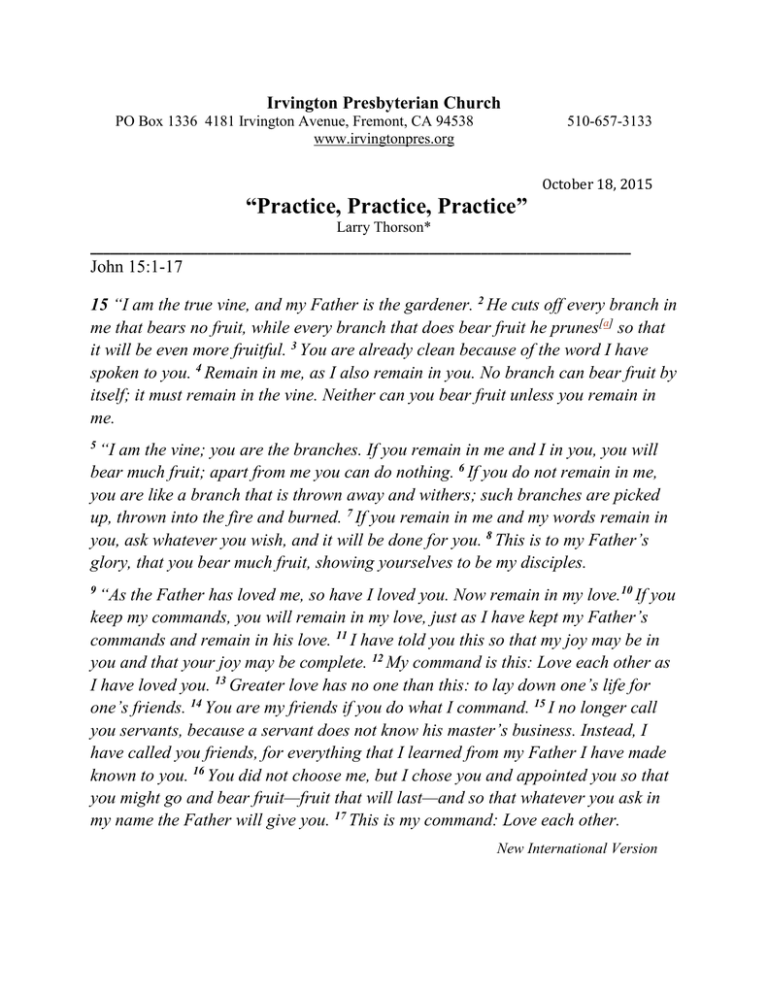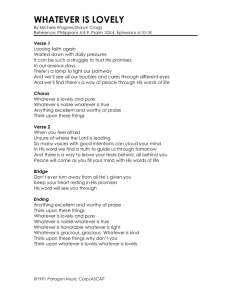Practice. - Irvington Presbyterian Church
advertisement

Irvington Presbyterian Church PO Box 1336 4181 Irvington Avenue, Fremont, CA 94538 www.irvingtonpres.org 510-657-3133 October 18, 2015 “Practice, Practice, Practice” Larry Thorson* ___________________________________________________________________________________ John 15:1-17 15 “I am the true vine, and my Father is the gardener. 2 He cuts off every branch in me that bears no fruit, while every branch that does bear fruit he prunes[a] so that it will be even more fruitful. 3 You are already clean because of the word I have spoken to you. 4 Remain in me, as I also remain in you. No branch can bear fruit by itself; it must remain in the vine. Neither can you bear fruit unless you remain in me. “I am the vine; you are the branches. If you remain in me and I in you, you will bear much fruit; apart from me you can do nothing. 6 If you do not remain in me, you are like a branch that is thrown away and withers; such branches are picked up, thrown into the fire and burned. 7 If you remain in me and my words remain in you, ask whatever you wish, and it will be done for you. 8 This is to my Father’s glory, that you bear much fruit, showing yourselves to be my disciples. 5 “As the Father has loved me, so have I loved you. Now remain in my love.10 If you keep my commands, you will remain in my love, just as I have kept my Father’s commands and remain in his love. 11 I have told you this so that my joy may be in you and that your joy may be complete. 12 My command is this: Love each other as I have loved you. 13 Greater love has no one than this: to lay down one’s life for one’s friends. 14 You are my friends if you do what I command. 15 I no longer call you servants, because a servant does not know his master’s business. Instead, I have called you friends, for everything that I learned from my Father I have made known to you. 16 You did not choose me, but I chose you and appointed you so that you might go and bear fruit—fruit that will last—and so that whatever you ask in my name the Father will give you. 17 This is my command: Love each other. 9 New International Version We’re continuing our Bill Hybels series The Power of a Whisper by looking at what it means to “practice” this thing called hearing from God. I’d like to open with a little word-association game. Here’s how it will work. I’ll name a role or a discipline, and you tell a person near you the name of the person who comes to mind that represents the world’s greatest in that discipline, as far as you’re concerned. First up: Basketball player. Name the basketball player that you think represents the world’s greatest basketball player. Actor NFL quarterback Singer Chef Golfer Ballet dancer Race-car driver Painter Author How do you suppose each of the “world’s greatest” people you named became so proficient in their respective disciplines? Sure, good DNA may have helped. Raw talent may have helped. Right place at the right time may have even played a role. But if there was one explanation for how these people got so good at singing or acting or playing golf, what do you suppose it is? Practice. We become what we practice. If you practice golf each day for four hours, most likely you will become a good golfer over time. If you practice the art of cooking every single day, most likely you will become accomplished as a chef. 2 What would you say you’re practicing these days? Maybe you’re trying to drop a few pounds, and so you’re practicing eating healthier meals or incorporating exercise into your daily routine. You’re an absolute sponge for health magazines, low-fat recipes, tips on working out. What are you practicing these days? Ralph Waldo Emerson said, “Sow a thought and you reap an action; sow an act and you reap a habit; sow a habit and you reap a character; sow a character and you reap a destiny”. What you and I think about has great bearing on who we are today … and on who we become tomorrow. We practice what we think about. So, what are we to think about? The apostle Paul gives us a really good list in Philippians 4:8:“Finally, brothers, whatever is true, whatever is noble, whatever is right, whatever is pure, whatever is lovely, whatever is admirable—if anything is excellent or praiseworthy—think about such things.” So are the thoughts you’re thinking true? Let’s think about this, if you’ve surrendered your life to Christ, then: You are chosen You are an adopted daughter or son You are a saint You are a joint-heir with Jesus Christ You are accepted You are redeemed and forgiven You are free forever from condemnation You are beloved You are the salt and light of the earth You are God’s temple You are God’s workmanship—literally his poema, his “poem” You are an overcomer You are safe in God’s firm grip You are able to withstand any temptation that comes your way You are invited into perpetual rest You are seated with Christ in the heavenly realm 3 Now are your present thoughts reflecting these truths? Or do you consistently find yourself believing lies? Lies such as: Nobody wants you Nobody loves you You’re worthless You’ll never be free from “that” sin Jesus’ purpose in coming to planet Earth was to testify to the truth, as John 18:37 says. But every scheme of the evil one begins with a lie … every problem we face in life traces back to us having bought a lie. To practice God’s presence—and thus to “bear much fruit”—we have to corral our thoughts. And the first way we do this is by thinking on that which is true. But the apostle Paul also tells us to think about that which is noble. Something that is “noble” is something that’s dignified and worthy of respect. Here’s one way to tell: If your thoughts tend to center on planning your next self-focused indulgence—your next drink, your next hit, your next online-porn session, and so forth—then you’re not quite passing the “noble” test. We’re called to be noble not just for our own spiritual, physical and emotional health in the here and now, but for the sake of the legacy that one day we’ll leave. Both in 1 Timothy 3 and in Titus 2, older men and women of faith are instructed to have noble character. They are told to be temperate, self-controlled, sound in their faith, worthy of respect. Why? Because as the church of Jesus Christ, we have a responsibility to raise up the next generation of leaders in a manner that honors God. We are called to be noble so that they will be noble. And guess where our noble character begins? You guessed it: it begins in our thought life. In 1 Kings 3 Solomon was just a kid but had recently taken over the throne from his father, David. One night, God appeared to Solomon in a dream and said, “What can I give you? Ask.” 4 Can you imagine God saying that to you? What can I give you as you begin this new chapter of life? Just ask away … and it will be yours! Solomon considers this grand offer and then, according to verses 6 through 9 in a paraphrase of the Bible called The Message, says this: Solomon said, “You were extravagantly generous in love with David my father, and he lived faithfully in your presence, his relationships were just and his heart right. And you have persisted in this great and generous love by giving him—and this very day!—a son to sit on his throne. “And now here I am: God, my God, you have made me, your servant, ruler of the kingdom in place of David my father. I’m too young for this, a mere child! I don’t know the ropes, hardly know the ‘ins’ and ‘outs’ of this job. And here I am, set down in the middle of the people you’ve chosen, a great people—far too many to ever count. “Here’s what I want: Give me a God-listening heart so I can lead your people well, discerning the difference between good and evil. For who on their own is capable of leading your glorious people?” When given the opportunity to name a request that God would fulfill, Solomon asked for the ability to tell good from evil, right from wrong. Not surprisingly, God granted the request. In fact, 1 Kings 3:10 says that God was “pleased” that Solomon had asked for this. God said to him, “Since you have asked for this and not for long life or wealth for yourself, nor have asked for the death of your enemies but for discernment in administering justice, I will do what you have asked. I will give you a wise and discerning heart, so that there will never have been anyone like you, nor will there ever be.” My question for you is this: Do you suppose God’s willingness to grant the ability to tell right from wrong stopped with Solomon? Or could it be that if you and I would make the same request—the request for God to impart to us wisdom to know the difference between what is right and what is wrong—it would be granted still today? 5 If we take James 1:5 at its word, then we know the answer to that question. “If you don’t know what you’re doing,” that verse says, “pray to the Father. He loves to help. You’ll get his help, and won’t be condescended to when you ask for it. Ask boldly, believingly, without a second thought …” Are you perplexed today about what is right or wrong in a specific situation you face? Ask your loving heavenly Father to tell you what is right. Ask him to point you toward wisdom’s way. He’ll do it. And evidently, he’ll do it joyfully, without condescension or judgment. What a promise that is! Again Paul in Philippians 4:8 says:“Finally, brothers, whatever is true, whatever is noble, whatever is right, whatever is pure, whatever is lovely, whatever is admirable—if anything is excellent or praiseworthy—think about such things.” To corral our thoughts in a God-honoring way, we have to think on those things which are pure. Purity is living life as God originally intended us to live it— free from artificial colors, artificial flavors, any additive of any kind. Here’s the deal with purity: If your thoughts are pure your actions will be pure as a result. Relationally, you will tell the truth. You will look to serve others’ interests instead of seeking your own gain. You will be obedient to those in authority over you. You will be a loving person. Academically, you will refuse to cheat in order to get ahead. In terms of entertainment, those who think pure thoughts will walk right past any picture, video or activity that promotes impurity as something worth pursuing. They will utterly disregard those things, knowing that they don’t represent God’s best for their lives. Vocationally, if you train yourself toward purity of mind, you will speak in affirming ways of people instead of gossiping, you will work diligently instead of being lazy, you will provide excellent products and services instead of getting by with whatever will “fly.” Sexually, you will treat others with utmost respect. You will live according to God’s design for your body. You will keep sex within the boundaries of the marriage relationship. 6 One surefire way to develop greater purity of mind is to simply prioritize other people’s needs above your own. Before you tell a lie to cover your rear end, think about how that lie will affect the other person. Before you sneak a peek at some provocative website, think about how planting those images in your mind will affect your relationship with your spouse. Consider the fact that the men or women you’re ogling are someone’s sons and daughters. They too were created in God’s image, and treating them with disrespect by staring at them in compromising positions is just not honoring to God. Before you spread secrets about colleagues at work, think about how that decision will affect their lives and their reputations. The list could go on, but my point is the same: When you focus your attention on caring for other people instead of constantly looking out for your own interests, you will start to cultivate purity of thought. Which leads, as we already discussed, to beautiful purity of action. The next category of thought Paul raises is one he names “lovely.” We are to think on things that are lovely. The original word here means “that which promotes peace instead of conflict.” Do your thoughts promote peace with others, or do they seek to divide, to cause dissention, to invite discord? Are you constantly thinking of ways to build bridges to other people’s minds and hearts, or do you find your thoughts drifting toward more selfish ends? Do you think more about endeavoring to understand the people God places in your path, or are you more interested in being understood? We are to think loving, lovely thoughts. Thoughts of love, harmony, peace; not thoughts of apathy, discord, harm. Lovely thoughts lead to lovely actions. I’d say our world could use more of those. Here is Paul’s final exhortation. What are we to think about? “Whatever is true, whatever is noble, whatever is right, whatever is pure, whatever is lovely … and whatever is admirable.” 7 We are to think on those things that are admirable. Another translation refers to these things as being “of good repute.” Things that are of good repute are positive, they are constructive, they are life-giving, they are helpful. Have you ever been around someone who spews negativity every time they open their mouth? If that person happens to be sitting next to you don’t look their way. Just keep your eyes up here! Whenever I get around people like that, I can’t help but wonder what their thought life must be like. Talk about depressing! So practicing the presence of God in our life is not that hard. If Jesus is living in your heart because you invited him in to be your savior then it’s a matter of corralling your thoughts. He is the vine from which us branches get our sustenance. Our thoughts will come out of the vine if our sustenance is coming out of Christ the vine. They come out of the vine if you regularly practice drinking from that vine. I have been told by health care professionals that we need to drink eight glasses of water each day in order to stay healthy. I know a man who drinks nothing but Pepsi. That’s his practice and he’ll reap the results of that practice. Will you drink of the Christ vine? “…whatever is true, whatever is noble, whatever is right, whatever is pure, whatever is lovely, whatever is admirable—if anything is excellent or praiseworthy—think about such things.” If you find yourself stuck thinking about something that’s not true, or noble or pure take a deep breathe, maybe a short walk, and by all means read out loud some positive Bible verses. You’ve got to practice cleansing your mind of thoughts that don’t build you or anyone else up. Practice, practice, practice. It will come. 8 TO LEARN MORE Join a Small Group – call the church office for times and location 510/657-3133 To learn and encourage one another IF YOU’D LIKE TO KNOW HOW TO GET STARTED IN FAITH 1. Recognize that everyone has sinned and fallen short of God’s ideal Romans 3:23 2. Know that the wages or payment for sinning is death Romans 6:23 3. But God loved us so much that He sent His only Son to die for us Romans 8:5 4. It is our responsibility to accept Jesus Christ as our Savior and allow Him to become the master of our life Romans 10:13 Invite Jesus into your heart by praying something like the prayer below… “Dear Lord Jesus, in many ways I have sinned against you. I am sorry and want to turn from my sinful ways. I invite you to come into my heart and begin to make me like yourself. I commit my life wholeheartedly to you now. Thank you for saving me.” 9








